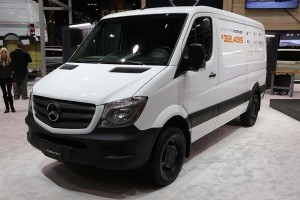
Mercedes expects its next generation Sprinter to be capable of adopting a battery-electric powerplant and autonomous driving features.
The next generation vans from Mercedes-Benz will be capable of supporting both battery electric propulsion and autonomous driving features in the future into a competitive landscape where electrification is destined to play a larger role.
Mercedes isn’t alone in its plans to move into the electric van and truck segment. Tesla CEO Elon Musk surprised some analysts earlier this month when he announced that the electric-vehicle company he founded is now looking to enter the truck market with a battery-powered vehicle.
Ulf Zillig, head of project VS30, which is developing the replacement for the current generation Sprinter, said the next-generation Sprinter due out in calendar-year 2018 will be about the same dimensions as the current Sprinter, but will have several improvements that will make it easier to drive.
It will better meet the requirements of the various companies that “upfit” the Sprinter for a growing variety of uses of all kinds, Zillig told TheDetroitBureau.com.
If market demand supports it, the next generation Sprinter will use electric powertrains and autonomous driving, added Zillig, who noted the van engineering teams at Mercedes-Benz are able to share technology across the company’s divisions.
(Mercedes readies Metris for major market push. For more, Click Here.)
Mercedes-Benz Van division introduced a medium-sized van, known in North America as the Metris, with an electric drive-train in 2012.
Volker Mornhinweg, the head of Mercedes-Benz Vans, told reporters the medium-sized electric van was greeted enthusiastically by potential customers but sales tapered off. However, cities, region and countries pushing tighter air-quality standards are expected to grow.
Mornhinweg was in the U.S. for the ground-breaking of the new $500 million van plant that Mercedes-Benz is planning to build in Charleston, South Carolina. The Charleston plant will open towards the end of the decade after the introduction of the next generation Sprinter in Europe.
In Stuttgart this week, Daimler Trucks revealed the Mercedes-Benz Urban eTruck, which was described the company as the “first fully electric” heavy-duty truck capable of carrying up 26 tons of cargo with zero emissions.
(Ford Transit helps conquer commercial truck world. Click Here for the story.)
The market launch of this technology could be ready by beginning of the next decade.
In the light distribution sector, Daimler Trucks has already been impressively demonstrating the day-to-day suitability of the fully electric truck in customer trials with the Fuso Canter E-Cell since 2014.
Wolfgang Bernhard, the executive responsible for Daimler Trucks & Buses, said the development of electric trucks and series is parts of Daimler’s effort to build on our technological leadership. For this purpose, a considerable part of the future investments by the truck division in the fields of research and development flow in the further development of the full electric drive, he said.
“Electric drive systems previously only saw extremely limited use in trucks. Nowadays costs, performance and charging times develop further so rapidly that now there is a trend reversal in the distribution sector: the time is ripe for the electric truck. In light distribution trucks, our Fuso Canter E-Cell has already been undergoing intensive customer trials since 2014,” Bernhard said.
(Click Here for more Mercedes news.)
“With the Mercedes-Benz Urban eTruck, we are now electrifying the heavy distribution segment up to 26 tons. We intend to establish electric driving as systematically as autonomous and connected driving,” he added.

